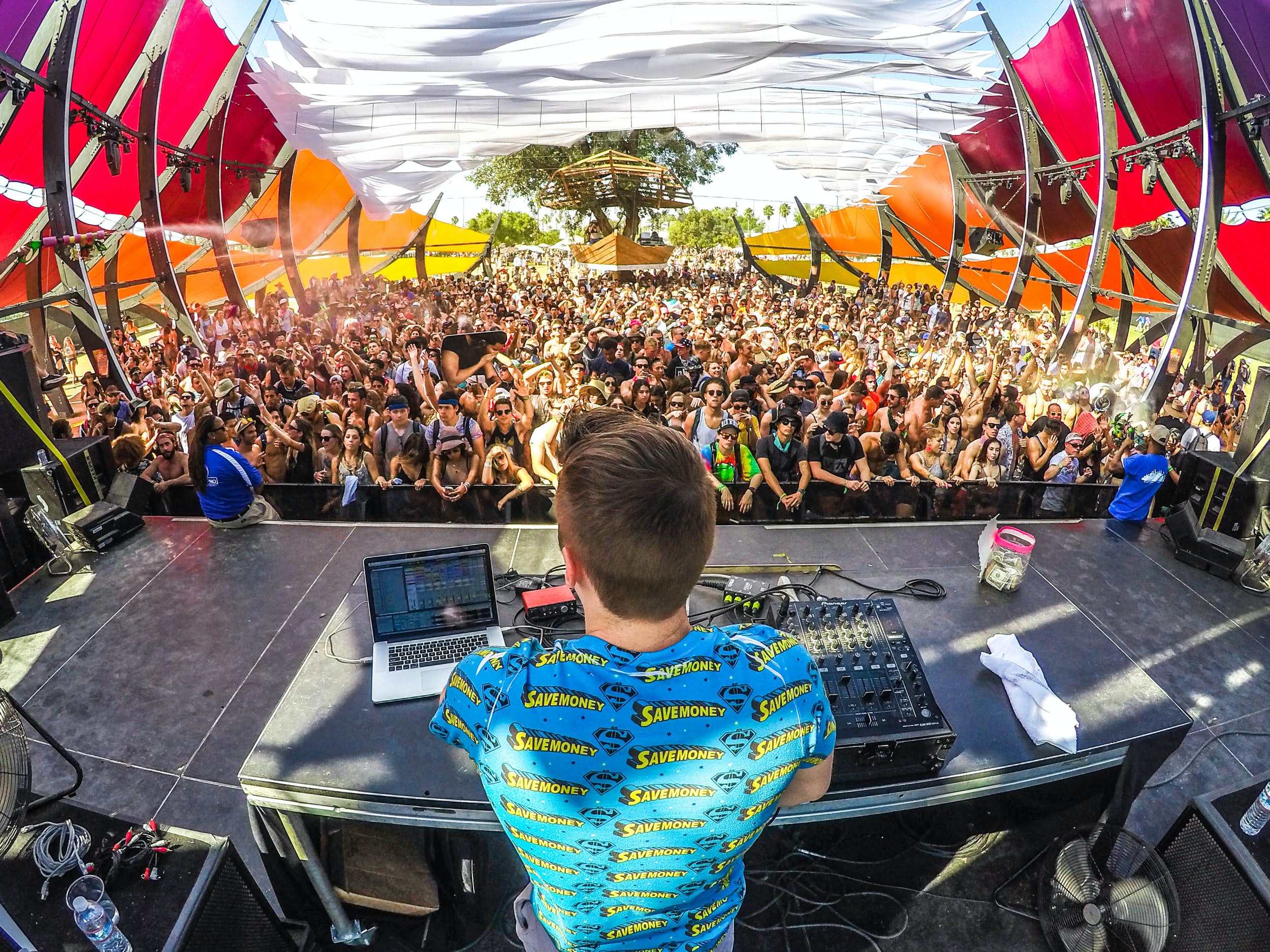In this blog post we will be discussing the potential earnings of DJs. While it is impossible to accurately estimate how much any given DJ will make, we can look at some recent trends in the industry in order to get an idea of what kind of money DJs are potentially making.
In short, DJs earn a wide range of salaries, depending on where they’re performing and how well-known they are. For example, a popular DJ playing at large music festivals or well-known clubs can make up to $200,000 annually. On the other hand, a more unknown DJ who only plays private parties may not even reach $20,000 in a year. For most DJs, the income is not consistent; some months may be extremely profitable and others not so much.
How do DJ’s earn money and what are their typical rates?
DJs typically get paid per hour or per gig. The exact rate that a DJ will earn depends on the type of event, the location, and how much experience the DJ has. Generally, DJs can expect to make between $100 and $500 an hour, though some may be able to charge more depending on their reputation and skill level. DJs may also be able to negotiate a flat rate, which is often more beneficial for both parties.
Many DJs also earn money through sponsorships and endorsements. Some well-known DJs have deals with headphone or sound system companies, while others are sponsored by clothing brands or other lifestyle products. These types of deals can add substantial income to DJ’s earnings.
Finally, DJs may also earn income through streaming services such as Spotify, Apple Music, and SoundCloud. Depending on the streaming service, a DJ can make anywhere from a few thousand to tens of thousands of dollars per month in royalties.
What skills do you need to be a successful DJ and how can you improve your chances of getting gigs?
To be a successful DJ, you need to have a good understanding of music production and mixing techniques. You should also know how to read a crowd and play the right music for the occasion. Additionally, marketing and networking skills are essential for any DJ looking to make it in the industry.
When it comes to getting gigs, having an online presence and a good portfolio are key. DJs should have an active website or social media accounts that showcase their work, as well as a demo reel of some of their best mixes. Additionally, having contacts in the industry can also be beneficial in getting gigs. It’s important to network with other DJs and promoters to increase your chances of being booked.
Overall, DJing can be a lucrative profession if you’re able to build up your reputation and hone your skill set. With the right combination of talent and marketing savvy, DJs have the potential to make some serious money in this industry.
What equipment do you need to start DJing and where can you find affordable deals on quality gear?
When it comes to DJing, you’ll need a few pieces of equipment. At the very least, you’ll need two turntables and a mixer. You may also want to invest in headphones, controllers, digital music software, and other accessories like LED lights and fog machines.
Fortunately, there are plenty of places where you can find quality equipment at affordable prices. Online retailers like Amazon and eBay are great resources for finding deals on DJ gear, while music stores often have sales and discounts on select items. You may also be able to find used gear from other DJs or at flea markets.
In conclusion, with the right amount of effort and dedication, anyone can become a successful DJ. With the right combination of talent, skill, and marketing savvy, DJs have the potential to make some serious money in this industry. Additionally, there are many resources available for those looking to start their own DJ business or find affordable gear. With proper research and preparation, you’ll be well on your way to becoming a successful DJ.
How can you market yourself as a DJ and get more gigs in your area or around the world?
Marketing yourself as a DJ is essential for getting more gigs. One of the most important steps to take is creating an online presence. Having your own website and active social media accounts will make it easier for potential clients to find you and get a better idea of what kind of music you specialize in. You should also create promotional materials, such as flyers and postcards, to give out at events.
Networking with other DJs and promoters is another key step in marketing yourself as a DJ. Establishing relationships with people in the industry can help you get bookings for gigs both locally and around the world. It’s also important to attend events related to your genre of music, as this is a great way to meet potential clients and grow your fan base.
Finally, it pays to be persistent. Reach out to clubs and other venues near you and don’t give up if you don’t get a response right away. You never know where your next gig could come from if you keep trying.
In conclusion, having a strong marketing strategy is essential for any DJ who wants to get more gigs. Developing an online presence, networking with other DJs and promoters, attending events related to your genre of music, and remaining persistent are all great ways to promote yourself as a DJ and increase your chances of success in the industry.
What are some common mistakes that DJs make when it comes to booking gigs, managing their finances, and promoting themselves?
One of the most common mistakes that DJs make when it comes to booking gigs is undervaluing their services. Many DJs are tempted to offer discounted prices in order to get more bookings, but this can be detrimental in the long run as it doesn’t take into consideration the artist’s time and effort. It’s important to set a fair rate for your services and stick to it.
Another mistake that DJs make is not managing their finances correctly. It’s important to keep track of your income and expenses, as this will help you understand how much money you are making or losing. Additionally, setting aside funds for taxes is essential so that you can stay on top of payments and avoid any penalties.
Finally, some DJs fail to take advantage of opportunities for self-promotion. Posting regularly on social media accounts, attending events related to your genre of music, and developing an online presence are all great ways to promote yourself as a DJ. Taking the time to create promotional materials such as flyers and postcards can also help you reach potential new clients.
In conclusion, there are many mistakes that DJs can make when it comes to booking gigs, managing their finances, and promoting themselves. It’s important to set a fair rate for your services and keep track of your income and expenses. Additionally, taking advantage of opportunities for self-promotion is essential in order to get more gigs and build your fan base. With the right strategy, you can be successful in this industry.
What determines how much a DJ can charge for their services?
The amount that a DJ can charge for their services is determined by a variety of factors, including the size and type of event, demand for the particular genre or style of music, and the experience and reputation of the DJ. Additionally, location plays a role in setting pricing; DJs tend to earn more in large metropolitan areas with higher costs-of-living. Ultimately, the DJ’s fee is a reflection of their perceived worth in the marketplace. Those with more experience and talent can command higher fees for their services than those who are just starting out. Other factors such as the reputation of the venue or promoter may also affect how much a DJ can charge for their services. Ultimately, the price is set by what the market will bear. In most cases, DJs should charge enough to make a living and to cover their expenses. Establishing a rate that reflects your skill level and experience is key to maximizing your earning potential. Doing your research on local market prices can help ensure that you are charging a fair rate for your services.
In conclusion, the amount that a DJ can earn from a single performance is determined by multiple factors such as skill level, experience, reputation and location. Additionally, negotiations with promoters or venues may affect how much a DJ can charge for their services. Ultimately, DJs should set fair rates for their services based on their skillset and the local market rates. With the right strategies, DJs can maximize their earning potential.
By taking into account all of these factors, DJs can ensure that they are compensated fairly for their services and make a living from their passion. With the right strategy and dedication, DJs can become successful in this industry.
What are some of the most popular places to book DJ’s for events and shows?
The most popular places to book DJs for events and shows vary by location, but some of the most common venues include nightclubs, bars, music festivals, corporate events, weddings, private parties, and radio/television stations. Additionally, many DJs also offer their services for streaming events such as live-streamed concerts or virtual DJ sets. Another great way for DJs to gain exposure is to submit mixes and demos to radio shows and podcasts. With the right strategies, DJs can increase their bookings and reach a wider audience.
In conclusion, there are many different venues and opportunities available for DJs to book gigs and promote themselves. By taking advantage of these opportunities, DJs can increase their visibility, gain more bookings, and ultimately earn more money from their craft. With the right strategies and knowledge of the industry, DJs can become successful in this field. With dedication and hard work, DJs can make a living doing what they love.
How do you become a successful DJ and start charging more for your services?
To become a successful DJ and start charging more for your services, there are several steps you can take. First, develop mastery of the craft by honing your skills and following industry trends. Additionally, build an online presence by creating a website or social media accounts to showcase your work. Also, network with other DJs in order to get booked for gigs. Once you have established yourself in the industry, create competitive pricing for your services that reflects your skill level and experience. Finally, market yourself through online promotions and by submitting demos to radio shows or podcasts. By taking these steps, DJs can increase their visibility and gain more bookings, thus earning more money from their craft. With dedication and hard work, DJs can make a living doing what they love.
Overall, becoming a successful DJ takes dedication and hard work, but with the right strategies, it is possible to make a living from your craft. By networking and marketing yourself, mastering the craft and setting fair rates for your services, DJs can increase their visibility and gain more bookings. Ultimately, with the right strategies, DJs can maximize their earning potential and start charging more for their services.
In conclusion, making a living as a DJ takes hard work and dedication, but by following the right steps and setting fair rates for your services, it is possible to make a good living from your craft. With the right strategies, DJs can increase their earning potential and become successful in this industry. With hard work and dedication, DJs can make a living doing what they love.
Are there any other ways to make money as a DJ outside of performing at events and shows?
Yes, there are many other ways to make money as a DJ outside of performing at events and shows. DJs can monetize their skills in many different ways such as creating and selling sound packs, producing music for other artists, teaching lessons or workshops, writing articles and blog posts about DJing or music production, starting a podcast or radio show, or creating custom mixes for clients. Additionally, DJs can also offer their services as a consultant to other artists or businesses, create videos and tutorials for streaming platforms such as YouTube, Twitch and Instagram TV, or even launch merchandise lines with their branding. These are just some of the many ways DJs can monetize their skills and make money from their craft.
Overall, there are many different ways for DJs to make money outside of performing at events and shows. By taking advantage of these opportunities, DJs can increase their visibility and gain more bookings, thus earning more money from their craft. With dedication and hard work, DJs can make a living doing what they love.
How do DJs typically price their services and what are some common fee structures used in the industry?
When it comes to pricing their services, DJs typically charge an hourly or per-event rate. DJs may also offer discounted rates for multiple bookings or package deals to attract clients. Additionally, some DJs may also offer all-inclusive packages which include a variety of services such as sound and lighting equipment rental, DJing services, and set-up and tear-down time.
In addition, DJs may also offer discounts for early bird bookings or for booking packages for multiple events. Furthermore, some DJs may also offer promotional discounts to build a larger client base or launch a new service. Finally, many DJs charge travel fees if the event is outside of their area of coverage.
These are just some of the common fee structures used in the DJ industry. By understanding these pricing structures, DJs can set fair rates for their services that reflect their skill level and experience. Ultimately, with the right strategies, DJs can maximize their earning potential and start charging more for their services.
Are there ways to negotiate rates with potential clients or employers in the DJ industry?
Yes, there are ways to negotiate rates with potential clients or employers in the DJ industry. By understanding the market and researching prices for similar services, DJs can set fair rates that reflect their skill level and experience. Additionally, DJs should be prepared to offer discounts or negotiate fees if they believe the client has a budget constraint.
Furthermore, DJs should always be willing to demonstrate their skills and present themselves professionally when negotiating rates. Additionally, DJs can also offer discounts or services if they’re able to book multiple events at once or are offered a long-term contract.
Overall, with the right strategies, DJs can maximize their earning potential by negotiating fair rates for their services. With hard work and dedication, DJs can make a living doing what they love.
Are there any other tips for earning more as a DJ?
Yes, there are many other tips for earning more as a DJ. Firstly, it’s important to stay up-to-date on the latest trends in the industry and learn new skills to stay competitive. Additionally, DJs should make sure to invest in quality sound and lighting equipment to provide the best experience for their clients.
Furthermore, DJs can also look into collaborations with other artists or businesses to further expand their services and gain more exposure. Additionally, DJs should create a website or social media profiles that showcase their work and promote upcoming events. Finally, DJs can also look into teaching classes or offering online tuition.
Finally, DJs should make sure to network with other industry professionals in order to find more opportunities and potential clients. By taking advantage of these tips, DJs can maximize their earning potential and start making a living from their craft. With dedication and hard work, DJs can make a living doing what they love.
What are some tips for reducing expenses as a self-employed DJ?”
As a self-employed DJ, there are many tips for reducing expenses. Firstly, it’s important to track all income and expenses in order to accurately calculate taxes and deductions. Additionally, DJs should look into purchasing their equipment second hand or borrowing from other DJs in order to save money.
Furthermore, DJs can also reduce travel expenses by networking with venues in their area or negotiating better rates for multiple bookings. Additionally, DJs should research any tax deductions and credits that apply to their business expenses.
Finally, DJs can also save money on office space by working from home or sharing an office space with other freelancers. By taking advantage of these tips, DJs can reduce their expenses and maximize their earning potential. With the right strategies, DJs can make a living doing what they love.








